英语被动句的翻译
- 格式:doc
- 大小:38.50 KB
- 文档页数:5
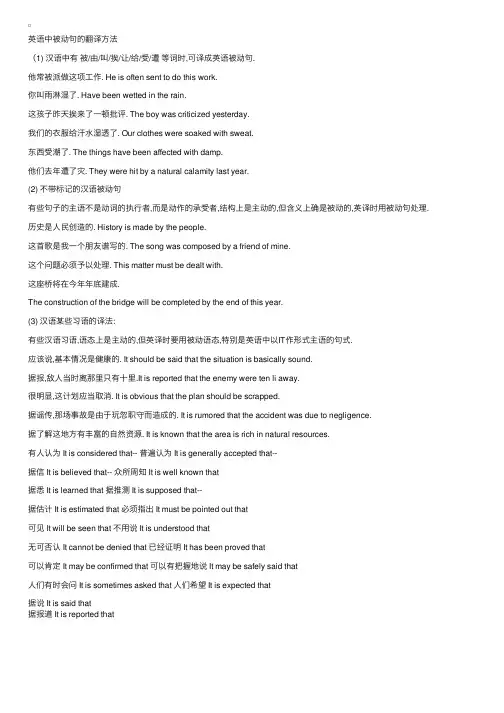
英语中被动句的翻译⽅法(1) 汉语中有被/由/叫/挨/让/给/受/遭等词时,可译成英语被动句.他常被派做这项⼯作. He is often sent to do this work.你叫⾬淋湿了. Have been wetted in the rain.这孩⼦昨天挨来了⼀顿批评. The boy was criticized yesterday.我们的⾐服给汗⽔湿透了. Our clothes were soaked with sweat.东西受潮了. The things have been affected with damp.他们去年遭了灾. They were hit by a natural calamity last year.(2) 不带标记的汉语被动句有些句⼦的主语不是动词的执⾏者,⽽是动作的承受者,结构上是主动的,但含义上确是被动的,英译时⽤被动句处理.历史是⼈民创造的. History is made by the people.这⾸歌是我⼀个朋友谱写的. The song was composed by a friend of mine.这个问题必须予以处理. This matter must be dealt with.这座桥将在今年年底建成.The construction of the bridge will be completed by the end of this year.(3) 汉语某些习语的译法:有些汉语习语,语态上是主动的,但英译时要⽤被动语态,特别是英语中以IT作形式主语的句式.应该说,基本情况是健康的. It should be said that the situation is basically sound.据报,敌⼈当时离那⾥只有⼗⾥.It is reported that the enemy were ten li away.很明显,这计划应当取消. It is obvious that the plan should be scrapped.据谣传,那场事故是由于玩忽职守⽽造成的. It is rumored that the accident was due to negligence.据了解这地⽅有丰富的⾃然资源. It is known that the area is rich in natural resources.有⼈认为 It is considered that-- 普遍认为 It is generally accepted that--据信 It is believed that-- 众所周知 It is well known that据悉 It is learned that 据推测 It is supposed that--据估计 It is estimated that 必须指出 It must be pointed out that可见 It will be seen that 不⽤说 It is understood that⽆可否认 It cannot be denied that 已经证明 It has been proved that可以肯定 It may be confirmed that 可以有把握地说 It may be safely said that⼈们有时会问 It is sometimes asked that ⼈们希望 It is expected that据说 It is said that据报道 It is reported that。
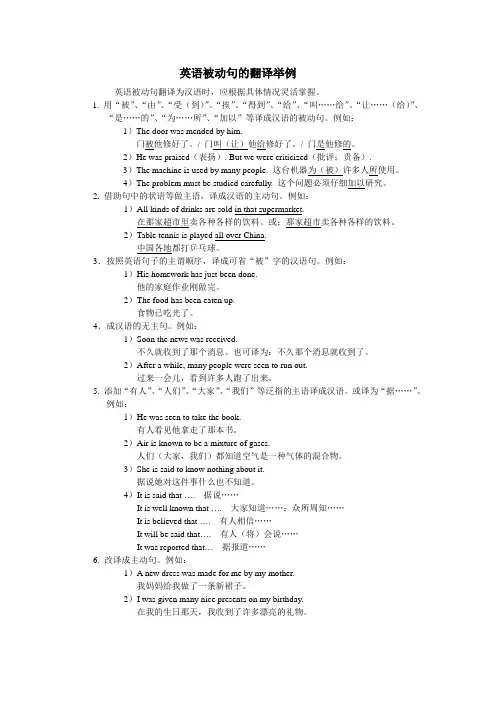
英语被动句的翻译举例英语被动句翻译为汉语时,应根据具体情况灵活掌握。
1. 用“被”、“由”、“受(到)”、“挨”、“得到”、“给”、“叫……给”、“让……(给)”、“是……的”、“为……所”、“加以”等译成汉语的被动句。
例如:1)The door was mended by him.门被他修好了。
/ 门叫(让)他给修好了。
/ 门是他修的。
2)He was praised(表扬). But we were criticized(批评;责备).3)The machine is used by many people. 这台机器为(被)许多人所使用。
4)The problem must be studied carefully. 这个问题必须仔细加以研究。
2. 借助句中的状语等做主语,译成汉语的主动句。
例如:1)All kinds of drinks are sold in that supermarket.在那家超市里卖各种各样的饮料。
或:那家超市卖各种各样的饮料。
2)Table tennis is played all over China.中国各地都打乒乓球。
3.按照英语句子的主谓顺序,译成可省“被”字的汉语句。
例如:1)His homework has just been done.他的家庭作业刚做完。
2)The food has been eaten up.食物已吃光了。
4.成汉语的无主句。
例如:1)Soon the news was received.不久就收到了那个消息。
也可译为:不久那个消息就收到了。
2)After a while, many people were seen to run out.过来一会儿,看到许多人跑了出来。
5. 添加“有人”、“人们”、“大家”、“我们”等泛指的主语译成汉语。
或译为“据……”。
例如:1)He was seen to take the book.有人看见他拿走了那本书。
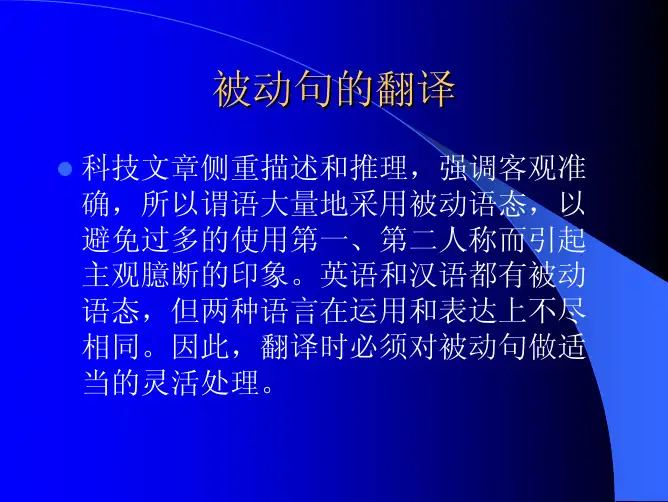

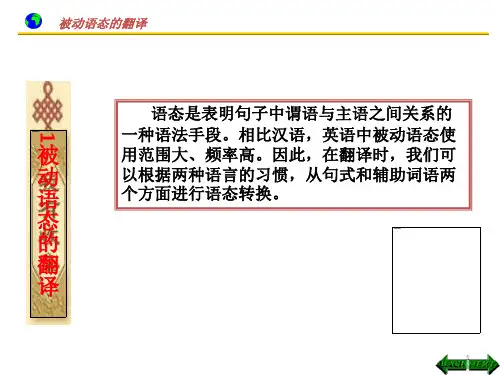
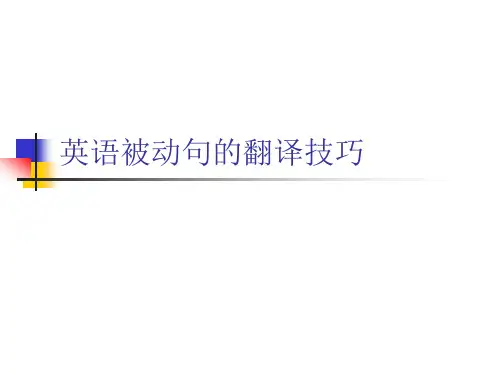
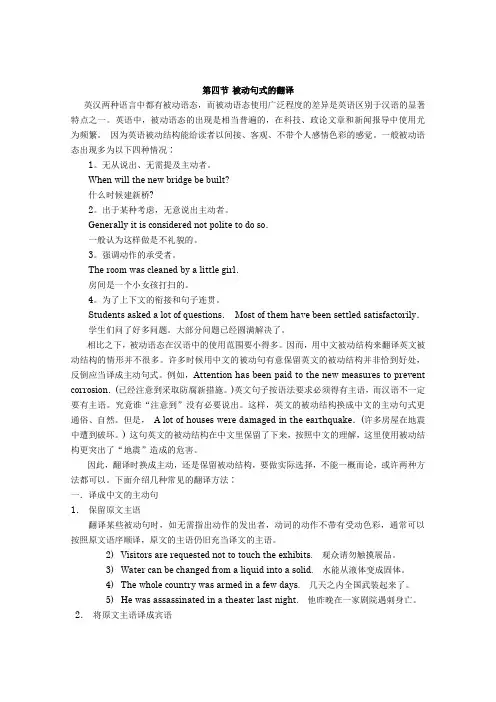
第四节被动句式的翻译英汉两种语言中都有被动语态,而被动语态使用广泛程度的差异是英语区别于汉语的显著特点之一。
英语中,被动语态的出现是相当普遍的,在科技、政论文章和新闻报导中使用尤为频繁。
因为英语被动结构能给读者以间接、客观、不带个人感情色彩的感觉。
一般被动语态出现多为以下四种情况∶1。
无从说出、无需提及主动者。
When will the new bridge be built?什么时候建新桥?2。
出于某种考虑,无意说出主动者。
Generally it is considered not polite to do so.一般认为这样做是不礼貌的。
3。
强调动作的承受者。
The room was cleaned by a little girl.房间是一个小女孩打扫的。
4。
为了上下文的衔接和句子连贯。
Students asked a lot of questions.Most of them have been settled satisfactorily.学生们问了好多问题。
大部分问题已经圆满解决了。
相比之下,被动语态在汉语中的使用范围要小得多。
因而,用中文被动结构来翻译英文被动结构的情形并不很多。
许多时候用中文的被动句有意保留英文的被动结构并非恰到好处,反倒应当译成主动句式。
例如,Attention has been paid to the new measures to prevent corrosion.(已经注意到采取防腐新措施。
)英文句子按语法要求必须得有主语,而汉语不一定要有主语。
究竟谁“注意到”没有必要说出。
这样,英文的被动结构换成中文的主动句式更通俗、自然。
但是,A lot of houses were damaged in the earthquake.(许多房屋在地震中遭到破坏。
) 这句英文的被动结构在中文里保留了下来,按照中文的理解,这里使用被动结构更突出了“地震”造成的危害。

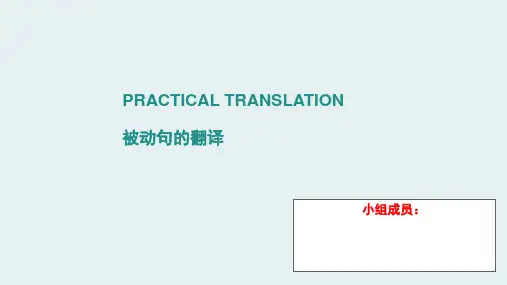

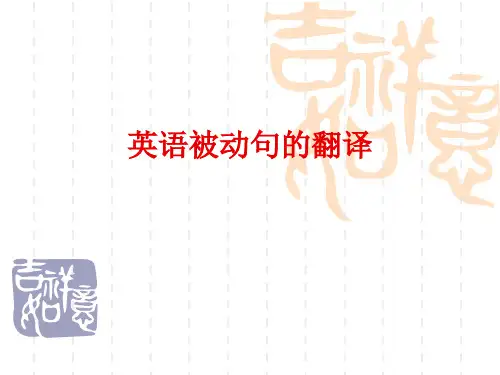
科技英语中使用大量的被动语态Attention must be paid to the working temperature of the machine.应当注意机器的工作温度。
而很少说:You must pay attention to the working temperature of the machine .你们必须注意机器的工作温度。
(1) It has been calculated that only 1/10, 000 part of the energy radiated annually form the sun is taken up by plants. 据计算,太阳每年辐射(到地球上)的能量只有0.01%被植物吸收。
(植物)( 2) It was found that one of the culture dishes in which colonies of the bacteria (细菌群体) were growing had been contaminated by a colony of another organism, a mould of penicillin. 结果发现在一个培养液中正在生长的细菌菌落受到另一种菌落的感染,这种菌落就是青霉菌。
青霉菌菌落感染了一个正在培养液中生长的细菌菌落。
(微生物)(3) The surface of a metal is attacked by various gases in the atmosphere. 金属的表面受到大气中各种气体的侵蚀。
(自然现象)(4) Each of the body systems is regulated in some way by some part of the endocrine system(内分泌系统). 人体的每个系统都在某一方面由内分泌的某一腺体进行调节。
(生理现象)( 5 ) Large quantities of fuel are required by modern industry. 现代工业需要大量的燃料。
英语被动句的翻译英语被动句的翻译1. The oil of the world will have been used up, and man will be using the more convenient power obtained from the splitting of the atom.全世界的⽯油将会⽤尽,⼈们将使⽤从原⼦裂变中获得的这种更为⽅便的动⼒。
2. Since the first test of the atomic bomb the world has learnt the atom can be split and its power can be used.⼈们从第⼀次原⼦弹的测试中知道了原⼦可以分裂,原⼦能可以使⽤。
3. A link-up of computers could mean that a large amount of information will be supplied to anyone who uses the system.将电脑连接起来意味着,使⽤该系统的⼈可以得到⼤量的信息。
4. The expansion of metals on heating must be taken into consideration before a long metal bridge is built.在建造⼀座⼤桥前,必须考虑到⾦属受热膨胀这⼀因素。
5. The Wright brothers were highly praised for having made the first flight in the world.莱特兄弟因为进⾏了世界第⼀次飞⾏⽽为⼈称道。
6. High voltage current is usually carried by overhead wire system so as to prevent living things being electrocuted.为了防⽌⼈畜触电,⾼压电⼀般采⽤⾼架线传送。
被动语态翻译英语中被动语态使用范围很广,凡是在不必或不愿说出或无从说出施动者以及为了便于连贯上下文或者为了强调动作的承受者等场合,往往都用被动语态。
英语被动句的翻译主要有以下几种情况:一、译成汉语主动句。
1.原句中的主语、谓语不变,译文中没有表示被动的标志,如“被、把”字等,形式上是主动句,表达被动意义。
例如:Eg. On Practice has been translated into many foreign languages. 《实践论》已译成许多国家的文字。
Eg. The whole country was armed in a few days. 几天以内,全国就武装起来了。
2.原句中的主语移到谓语之后,译作宾语。
Eg. Another middle school has been set up in our district.我们区又办了一所中学。
Eg. 1,200 people had been saved soldiers in the earthquake. 在地震中,战士们已救出1200人。
3.译成带表语的主动句。
Eg. The decision to attack was not taken lightly. 进攻的决定不是轻易作出的。
Eg. In the old society,women were looked down upon. 在旧社会,妇女们是受歧视的。
4.含主语从句的被动句型译为主动句。
以it作形式主语的英语句子,翻译时常要转为主动形式,有时可加上“有人”、“大家”、“我们” 等不确定主语。
例如:Eg. It is reported that the enemy has been breeding new strains of killer viruses.据报道敌人正在培育新的杀人病毒。
Eg. It is suggested that meeting be put off till next Monday.有人建议会议推迟到下星期一举行。
被动结构怎么译英汉两种语言,都有被动结构。
然而,英语有别于汉语的特点之一,正在于被动语态的广泛应用,而汉语中较少使用被动语态。
两者有别的另一个特点是被动语态的构成各异。
英语是"形合"语言,其被动语态是通过改变动词的形式来实现的,汉语是"意合"语言,其被动语态则由有明表被动之意或靠暗含被动之义的字词来实现的。
英语被动语态的广泛应用,自有其道理。
在说不出主动者或不愿意说出主动者,或没有必要说出主动者或为了突出被动者、或为使上下文连贯衔接的时候,使用被动语态就方便多了。
而且,被动语态把要说明的问题放在句子的主语位置上,一是更能唤起人们的注意,二是不带感情色彩,简洁客观。
这些独特之处,尤其适应科技作品的需要。
汉语被动语态的使用范围较窄,是因为汉语突出主题,而英语突出主语,汉语具有英语所没有的无主句,许多被动句可以用无主句来代替。
然而,英语的被动结构,也不能滥用。
在新闻写作上,美国名记者、语言大帅杰克·卡彭就在《美联社新闻写作指南》上提出"避免讨厌的被动语态","只要有可能就应当使用主动语态"。
他认为,"在多数情况下,被动语态是松驰无力的,它把采取行动的人排除在画面之外。
这是为什么官样文章的作者都醉心于被动语态的原因。
"他举例说,Police arrested John Smith(警察逮捕了约翰·史密斯)要比John smith was arrested by Police(约翰·史密斯被警察逮捕)更为简洁、利落、有力。
当然,如果约翰·史密斯是一位公众人物,为了新闻价值的要求,他的大名可以打头。
他还讲了一个饶有趣味的实例,说明软弱无力的被动语态和坚定有力的主动语态的区别是实际的而且带有预兆的性质。
在敲诈勒索和恐怖威胁的信件中说"我要杀了你"的人,可能是真会玩命的,而说"你会被杀死"的人则有可能动摇,不敢"公然承认自己就是发出威胁的人"。
了解两种语言在被动语态中的异同以及英语被动语态的应用特点,可以帮助我们准确把握被动结构的句字,获得理想的译文。
被动结构的翻译方法,主要有如下几种:一、化"被动"为"主动"一般说来,由于英语被动语态结构用得多,英译汉的时候,变为主动语态的情形也就十分普遍了。
而这种化"被动"为"主动"的技巧,在实际操作上,也是多种多样的。
(-)译为有主句这里,又有"反宾为主,变主为宾"、"增译主语,泛指'有人'"和"原文主语,'主'位坐稳"三种情形:1.反宾为主,变主为宾翻译的时候,把原文的主语,即行为的客体,译成宾语而把主体或相当于行为主体的介词宾语译成主语。
这里举一个有趣的例子:例1:THE TIMES is read by the people who run the country; THE GARDIAN is read by the people who would like to run the country; THE FINANCIAL TIMES is read by the people who own the country and THE DAILY TELEGRAPH is read by the people who remember the country as it used to be.这是一段说明报纸读者群体情况的英文原文。
不同的报纸,拥有不同的读者,不同的读者追逐不同的消息。
因此,就有了下面四句意味深长的打油诗:在位掌权的人读《泰晤士报》,渴望掌权的人读《卫报》,大老板们读《金融时报》,怀念大英帝国曾经了不起的人读《每日电讯报》。
例2:Modern scientists have discovered that energy may be created from matter and that matter, in turn, may be created from energy. 现代科学家发现.物质可以产生能,能可以产生物质。
2. 增译主语,泛指"有人"翻译的时候,把原文的主语译成宾语,增译"有人"、"人们"、"大家"、"我们"等泛指性的主语。
例3:With the rapid development of modern science and technology, information can be sent to every part of the world.随着现代科学技术的迅速发展,我们能把各种各样的信息传到世界各地。
例4:To explore the Moon's surface, rockets, satellites and airships were launched again and again. 为了探测月球的表面,人们一次又一次地发射火箭、卫星和飞船。
3. 原文主语、"主"位坐稳翻译时,原文的主语地位不变,在译文中仍为主语。
这时,汉语译文中虽无"被"字,但被动的意义已暗合在内。
例5:Gerald Ford was voted out of office after two years and now Jimmy Cater, after four.这是内含省略结构的被动结构。
翻译时,句中主语不变,省略的部分也灵活补上原文含义:吉拉德·福特在位才两年便落选下台;而吉米·卡特在任也就是四年。
例6:New high-tech achievements have been applied to agricultural production.高新科技的成果已应用于农业生产。
例7:If the technology and techniques are really advanced, co-operation can be prolonged. 如果技术确实先进,合作期限可以延长。
(二)译为无主句,主语译成宾语在不知道或者不必说出行为主体时,常常可以发挥汉语译文的优势,把英语的被动语态译成汉语的无主句。
这时,原文的主语译为动词的宾语。
例8:To develop economy, different kinds of talented people should be organized. People of real ability should be especially promoted and given raise. 要发展经济应当组织使用各种各样的人才。
对那些真正有本事的人,在工资级别上可以破格提高。
例9:For example, a computer was once used to design a brewery. 例如曾经利用一台计算机来设计一间啤酒厂。
(三)主语谓语合译英语的一些动词成语含有名词,如make use of, pan attention to, take care of, make reference to, take account of等等,变成被动语态时成了名词作主语的特殊被动语态。
汉译的时候,可以把主语和谓语合起来翻译,译成汉语无主句的谓语。
例10:Care should be taken at all times to protect the computers and other instruments in the lab from dust and damp. 要始终注意保护实验室中的电脑和其他仪器, 勿使其沾上灰尘,勿使其受潮。
例11:Use can be made of these materials to write a report on the delegation's visit to South Africa.可以利用这些资料写一份该代表团访问南非的报告。
二、以"主动"表"被动"汉语有一种"是……的"结构,是一种形式主动,实际上是不用"被"字的被动句,着重说明一件事情是如何产生或在何时何地产生的。
在翻译英语被动结构的时候,可以利用这种形为主动的"是……的"结构,表示被动的实际意义。
例12:These stone processing machines have been introduced from Italy for the newly established factory. 这些石材加工机器是为新建工厂而从意大利引进的。
例13:The Secondary School is named after a donator who made a contribution of 50 million RMB yuan.这所中学是以一名出资五千万元人民币的捐赠人的名字命名的。
例14:Although the dreams of seeing and hearing things from far, far away was made by human beings several thousand years ago, such dreams came into reality in modern times. 虽然"千里眼"和"顺风耳"是人类几千年前所梦想的但直到现代社会才梦想成真。
例15:This five star hotel was built in 1997 for Hong Kong's return to the motherland.这家五星级酒店是为迎接香港回归祖国而于1997年建成的。
三、以"被动"译"被动"虽然汉语被动语态使用的范围较窄,但并不是说汉语极少用被动句。
有人认为汉语有四种表示被动的方式,一是在谓语前加上"被"字;二是在行为主体前加上"被"、"由"、"受"、"为……所"等字;三是谓语前省去"被"字不出现行为主体的被动句;四是"是……的"的结构。